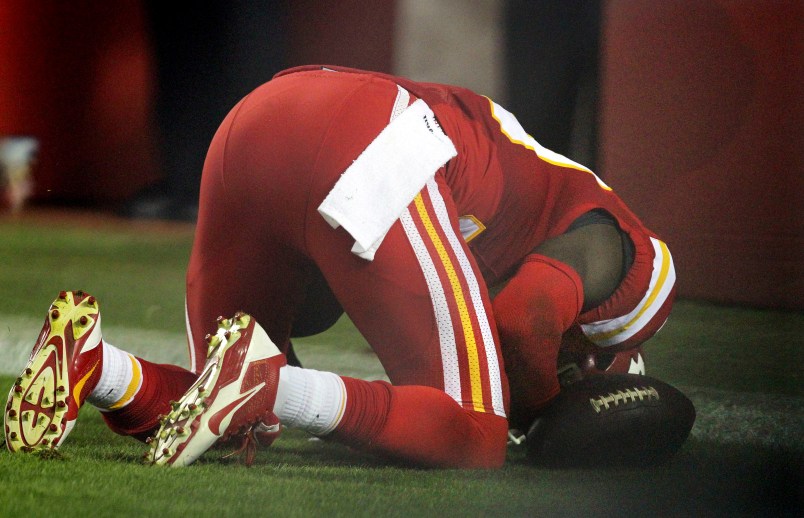What an ironic twist. In the same month the NFL is trying to restore its image off-the-field, its latest guffaw happened on the field, in just a moment’s time. The NFL has admitted it was wrong to penalize Kansas City Chiefs safety Husain Abdullah, a devout Muslim, for going to his knees in a gesture known as sujood, as we saw famously during Algeria’s H World Cup match this summer, after he scored a touchdown in Monday’s win over the New England Patriots. As NFL spokesman Michael Signora stated, “Rule 12, Section 3, Article 1 (d) states ‘players are prohibited from engaging in any celebrations or demonstrations while on the ground.’ However, the officiating mechanic in this situation is not to flag a player who goes to the ground as part of religious expression, and as a result, there should have been no penalty on the play.”
Unfortunately the fans watching the game felt, if they, as a Jew, Muslim, Sikh, Hindu, or Buddhist have a different way of praying than let’s say Tim Tebow, who has become known for his trademark prayer stance, they too would be quickly and swiftly ostracized. Religious discrimination in America is as nuanced as our nation’s diversity, with many communities facing unique forms of discrimination. When the referee penalized Husain Abdullah, those watching the game felt he revealed a hidden bias and thus, they needed the NFL to clarify its rules. We know that Tim Tebow’s trademark prayerful pose does not get him penalized and this double standard brings to light our implicit biases. Many of us have these biases and biases that involve things like gender, faith, and sexual orientation can cause significant damage – both to ourselves and the people with whom we interact.
In the NFL’s case, their biases are being called out, almost without disruption, and we are seeing little, if no, change. Take for example, the battle over the name and mascot of the Washington Redskins that has been waging for decades. In 1971, the Washington Daily News printed an article by Tom Quinn that discussed this controversy, noting that the word is “the white people’s way of making a mockery, like they used to do to the blacks in the South.” Yet the team name remained unchanged for decades, even before Dan Snyder’s majority ownership.
The NFL’s latest inability to own up its to mistakes and like any employer, understand their role when their employees do grave wrongs, as in the case of Ray Rice and other domestic violence cases, is particularly troubling. There is no institution in our land, whether it is a Fortune 500 company or a governmental body, who would retain their “CEO”, in this case NFL Commissioner Roger Goodell, after a significant series of missteps in which the truth was hidden from the fans and press at every turn. But Goodell stays.
Recently, SALDEF, the Sikh Coalition, and international Sikh community came together to lobby FIBA to allow Sikh players to wear their dastars (turbans) on the court, as Sikh players were forced to remove their turbans mid-way through games throughout the summer. FIFA and NCAA-turbaned players do not play under such unfair policies. As of today, the International Basketball Federation (FIBA) has decided to relax its ban on religious headcoverings in limited circumstances as part of a “trial period.” Religious exceptions still cannot be granted for international matches, and FIBA will decide whether to implement
permanent changes to its religious accommodation policy in 2016. That’s why this month Qatar had to forfeit matches against Mongolia and Nepal after FIBA declared five of their 11 players could not play in hijabs.
Athletic institutions cannot reap the benefits of positioning themselves as purveyors of culture that bring the world together when they do the opposite, both on and off the field. On Game Day, all of the fans know that we are one. When will the NFL and FIBA start playing our game when they do the opposite by treating similarly situated players inconsistently and creating divisions among us?
Jasjit Singh is the Executive Director of the Sikh American Legal Defense and Education Fund (SALDEF) and has been with the organization since 2009. He currently serves on DHS Secretary’s Faith-Based Initiative and serves on the Executive Committee of the National Council of Asian Pacific Americans (NCAPA).







Religious exception? That’s bizarre. Allow displays or ban them — don’t create arbitrary categories of privilege.
Didn’t matter. God was listening and the Patriots got crushed by the Chiefs.
Am I reading too much into it that maybe God sides with the indigenous?
oh boy this is going to be fun. I will be closely watching,
so I don’t miss it, usually I don’t last further than the first christianist
posturing. Anyway I can’t wait for the first Pastafarianist’ first
touchdown. I think it’s a dead-nuts certainty there will be some
sort of celebration, and in light of all the christianist horseshit
being forced on them this could be payback time. One can only hope.
Unless some idiot comes up with the gem "get rid of any and all
fookin religion in sports and in government.’ (http://en.wikipedia.org/wiki/Flying_Spaghetti_Monster).
“There is no institution in our land, whether it is a Fortune 500 company or a governmental body, who would retain their “CEO”, in this case NFL Commissioner Roger Goodell, after a significant series of missteps in which the truth was hidden from the fans and press at every turn.” Hmmm. Not sure I agree with that one. Wall Street comes to mind.
I agree with everyone–including the player in question–who said he got flagged for the slide that he did in the end zone before the prayer. It’s unfortunate, but I don’t think it was an attempt to ban his religious speech. They should’ve swallowed the whistle once they saw he was praying, but there was a part of the display that violated their standard for unsportsmanlike behavior separate from the prayer.